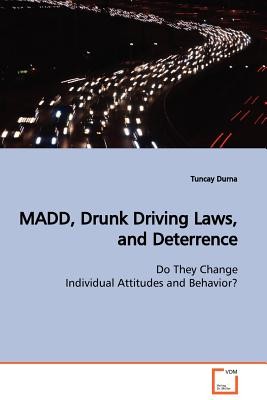
- We will send in 10–14 business days.
- Author: Tuncay Durna
- Publisher: VDM Verlag
- ISBN-10: 3639132211
- ISBN-13: 9783639132212
- Format: 15.2 x 22.9 x 0.7 cm, softcover
- Language: English
- SAVE -10% with code: EXTRA
Reviews
Description
With the effect of Mothers Against Drunk Driving (MADD) and some other citizen activist groups, anti drunk driving policies led to adoption of deterrent based laws. However, research findings on the effects of those laws are mixed and cannot explain the decline on alcohol related fatalities. Moving beyond the published literature on this topic, it is hypothesized that deterrent based laws not only have a simple deterrent effect through the threat of punishment, but also have a moralizing and educative effect on individual attitudes and behavior. Unlike the previous research, this study uses both aggregate and individual level data together. Second, the effects of the laws are examined over the time, not cross-sectional. Moreover, the impact of MADD on state adoption of drunk driving laws is empirically evaluated for the first time. The results provided strong evidence for effectiveness of deterrent based laws on individual attitudes and behavior. The findings also indicate that MADD is an important factor in shaping drunk driving policies. The analyses should be especially useful to activist groups, professionals in traffic safety, and to researchers in this area.
EXTRA 10 % discount with code: EXTRA
The promotion ends in 17d.04:19:01
The discount code is valid when purchasing from 10 €. Discounts do not stack.
- Author: Tuncay Durna
- Publisher: VDM Verlag
- ISBN-10: 3639132211
- ISBN-13: 9783639132212
- Format: 15.2 x 22.9 x 0.7 cm, softcover
- Language: English English
With the effect of Mothers Against Drunk Driving (MADD) and some other citizen activist groups, anti drunk driving policies led to adoption of deterrent based laws. However, research findings on the effects of those laws are mixed and cannot explain the decline on alcohol related fatalities. Moving beyond the published literature on this topic, it is hypothesized that deterrent based laws not only have a simple deterrent effect through the threat of punishment, but also have a moralizing and educative effect on individual attitudes and behavior. Unlike the previous research, this study uses both aggregate and individual level data together. Second, the effects of the laws are examined over the time, not cross-sectional. Moreover, the impact of MADD on state adoption of drunk driving laws is empirically evaluated for the first time. The results provided strong evidence for effectiveness of deterrent based laws on individual attitudes and behavior. The findings also indicate that MADD is an important factor in shaping drunk driving policies. The analyses should be especially useful to activist groups, professionals in traffic safety, and to researchers in this area.


Reviews